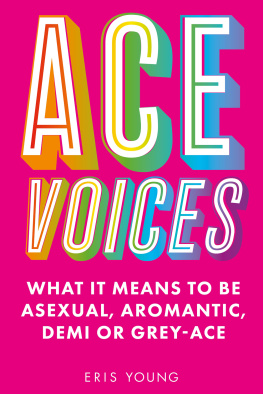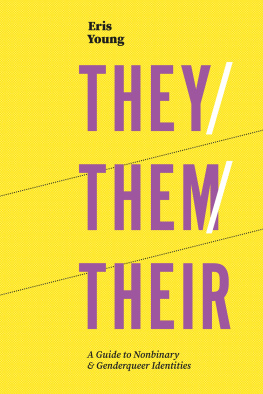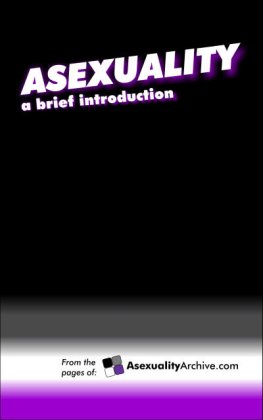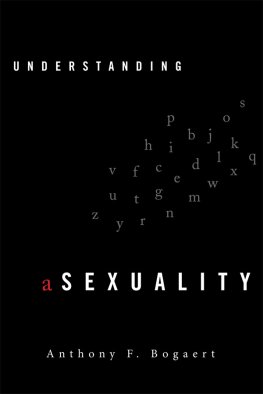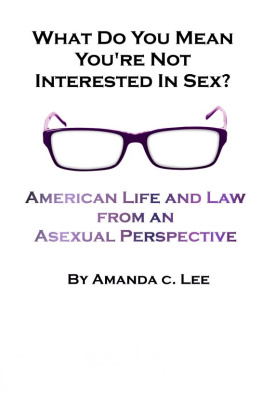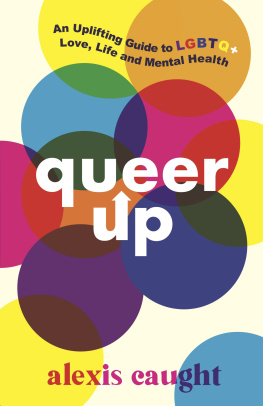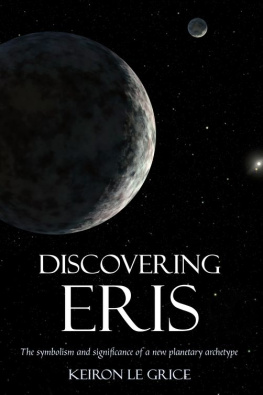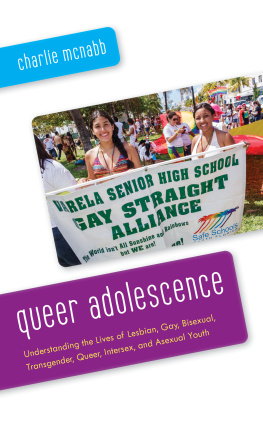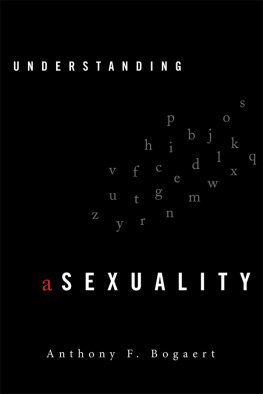Contents
Page list

by the same author
They/Them/Their
A Guide to Nonbinary and Genderqueer Identities
Eris Young
ISBN 978 1 78592 483 5
eISBN 978 1 78450 872 2
of related interest
How to be Ace
A Memoir of Growing Up Asexual
Rebecca Burgess
ISBN 978 1 78775 215 3
eISBN 978 1 78775 216 0
How to Understand Your Sexuality
A Practical Guide for Exploring Who You Are
Meg-John Barker and Alex Iantaffi
ISBN 978 1 78775 618 2
eISBN 978 1 78775 619 9
Sounds Fake But Okay
An Asexual Perspective on Love, Relationships, Sex, and Pretty Much Anything Else
Sarah Costello and Kayla Kaszyca
ISBN 978 1 83997 001 6
eISBN 978 1 83997 002 3
I Am Ace
Advice on Living Your Best Asexual Life
Cody Daigle-Orians
ISBN 978 1 83997 262 1
eISBN 978 1 83997 263 8
Ace Voices
What It Means to Be Asexual, Aromantic,
Demi or Grey-Ace
Eris Young

First published in Great Britain in 2023 by Jessica Kingsley Publishers
An imprint of Hodder & Stoughton Ltd
An Hachette UK Company
Copyright Eris Young 2023
All rights reserved. No part of this publication may be reproduced, stored in a retrieval system, or transmitted, in any form or by any means without the prior written permission of the publisher, nor be otherwise circulated in any form of binding or cover other than that in which it is published and without a similar condition being imposed on the subsequent purchaser.
A CIP catalogue record for this title is available from the British Library and the Library of Congress
ISBN 978 1 78775 698 4
eISBN 978 1 78775 699 1
Jessica Kingsley Publishers policy is to use papers that are natural, renewable and recyclable products and made from wood grown in sustainable forests. The logging and manufacturing processes are expected to conform to the environmental regulations of the country of origin.
Jessica Kingsley Publishers
Carmelite House
50 Victoria Embankment
London EC4Y 0DZ
www.jkp.com
To us.
Acknowledgements
One hundred thousand thank yous to all of the people who shared their experiences with me: AK, AQ, BC, BH, CF, DC, EH, EL, EP, HBJ, HD, HG, JH, JTS, LG, LH, LL, LM, LV, NT, RH, RK, RR, SKW, SS, VC, and to those who remained anonymous, for your openness and generosity. Also to all my a-spec friends, especially CW, DL and SG: thank you for being part of my life. Thank you to Dalry Dinners, for putting up with my constant moaning. Thank you to Angela Chen, Lee from Acing History and all the others doing this work alongside me. Thank you to Mom and Dad, for never pressuring me to settle down and get married. Finally, thank you to Kez, for long chats about this stuff even when were both tired, and to Annita, Im glad we found each other when we did.
Contents
Throughout these pages, you will find mention of topics that some readers may find distressing, including sexual assault, childhood sexual abuse, genocide, the transatlantic slave trade, forced sterilisation and corrective rape. I mention these subjects only in my exploration of the ways that a-spec people are and have been marginalised and do not go into detail, but I will flag them up at the beginning of a chapter, nonetheless.
A note on anonymity
The people who I spoke to in depth for this project, and whom I quote in the following text, were given the option to be either referred to by their initials or be completely anonymous. For those who chose to remain completely anonymous I have assigned a random combination of letters (i.e. OC, QL, AZ, etc.) with no connection to their actual initials.
I almost didnt write this book. There was a moment, before I signed the contract, when I seriously questioned whether I should be the one to take on a project that was to my mind at least so very important. I knew I was asexual; that hadnt been in doubt since high school, but I felt like I should confess to my publishers to my readers , even that I was not entirely comfortable with this fact. I hadnt yet (in the language I used back then) come to terms with it: I didnt yet know how I could be ace and still have a future. Surely, I thought, the person writing this book shouldnt still be carrying around the shame that I hadnt yet managed to let go of?
In hindsight, I recognise this as impostor syndrome. I know that the way I was thinking of my asexuality as if it was a kind of diagnosis I would have to live with and try to live my life in spite of did not come from me but from what I had been told about what asexuality meant. This shame came from the way that everyone around me for most of my life spoke about sex, and sexual and romantic relationships: as a fundamental human need, something without which I could not be fully human.
As you can probably guess, I did end up signing the contract. Part of me must have known that not only did I want to write this book, I needed to write it, because I needed to unlearn all the things I had been told about myself that made me ashamed of who I was. I needed to write this book because I knew this project could benefit the community my community and I knew the community was out there somewhere, but I didnt really believe it. I knew other people shared my experiences and that those experiences were valid, but again, I didnt really believe it. I was still feeling alone in my ace-ness.
What I hadnt yet realised, what I wouldnt fully understand until Id actually started writing, was that many, many of us feel exactly as I did. In that sense, my insecurity itself made me a good fit to write it, because it united me with countless others who were like me and felt the same. It created a tension in me, a drive to try to use this book to help my community and myself, not from a place of peace and self-acceptance, but very much from a place of need.
Many people on the asexual spectrum spend much of their lives believing they are the only ones like this the only person in the world who doesnt want a boyfriend, who isnt comfortable having sex with their partner even though theyve been together for years, who cant understand how others recognise that ineffable spark, romantic love. I myself spent years waiting to feel it even though no one ever really told me what it was and believing there was something wrong with me when I didnt.
We come to think of ourselves as abnormal, sick, broken or missing something. We are told that there is no way to be as we are and still be happy, and therefore we need to be fixed. Lots of us dont get the chance I got and spend their whole lives thinking this. Thinking that in order to have a place in society, in order to be deserving of love, we have to change ourselves, sometimes painfully.
Whats become clear to me while Ive written this book, reading and listening to the experiences of people like me, is that none of this is our fault. Theres nothing about being asexual, aromantic, demi or grey-a that is inherently bad, wrong, sick or broken. I want to take pains to tell anyone reading this who has felt broken, or ashamed, or alone, because of who they are: there is nothing wrong with you, and though you may feel alone, you are not.
We feel shame because were living in a world that hasnt yet made room for us. Were erased and marginalised because asexuality, aromanticism, demi and grey-a identities challenge the status quo. Any refusal by any person to abide by the role society dictates for them puts has always put them at risk of being pathologised, dismissed, demonised or otherwise disempowered or rendered invisible. This is hard-won knowledge, and its come at the end of more than two years of studying, listening and learning, of speaking to people who were like me, finding them among friends and people I admire, of reading words people like me had written. I hope that by sharing some of that knowledge in the form of this book, Ill make it a little easier for the next person to go through what I went through.

